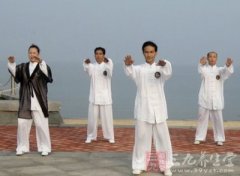Effect of Tai Chi training on walking ability and fear of fa
摘要:
[目的]探讨太极拳训练对帕金森病病人步行能力和害怕跌倒的影响。[方法]选择62例帕金森病病人为研究对象,随机分为干预组和对照组各31例。对照组接受神经内科常规护理,干预组在此基础上进行12周的太极拳训练。应用步态时间距离参数变化量表、“起立行走”计时测试(TUGT)评估病人的步行能力,用Berg平衡量表(BBS)和平衡信心量表(ABC)评估病人的平衡能力和害怕跌倒的程度。[结果]干预前两组病人步速和步长、BBS评分、TUGT结果比较差异无统计学意义(P>0.05);干预后两组病人步速和步长、BBS评分、TUGT结果比较差异有统计学意义(P<0.05)。[结论]太极拳训练可以提高帕金森病病人的步行能力,对改善病人害怕跌倒的状况有积极的效果。
Abstract:
Objective:To probe into the effect of Tai Chi training on walking ability and fear of falling(FOF)of patients with Parkinson’s disease.Methods:A total of 62 patients with Parkinson’s disease were selected and di-vided into intervention group(3 1 cases)and control group(3 1 cases)randomly.Routine rehabilitation exercises of neurology were used for the patients in control group,in addition,the patients in intervention group added Tai Chi training;all the intervention last for 1 2 weeks.The gait scale and Timed “Up and Go”Test(TUGT)were used to evaluate patient’s walking ability;The Berg Balance Scale(BBS)and Activities Specific Balance Confi-dence(ABC)were used to evaluate patients’balance function and the degree of FOF.Results:After interven-tion,the scores of velocity and step length,BBS score,TUGT results in intervention group were significantly higher than those in control group(P<0.05).Conclusion:Tai Chi training could improve the walking ability of patients with Parkinson’s disease and reduce their FOF.










